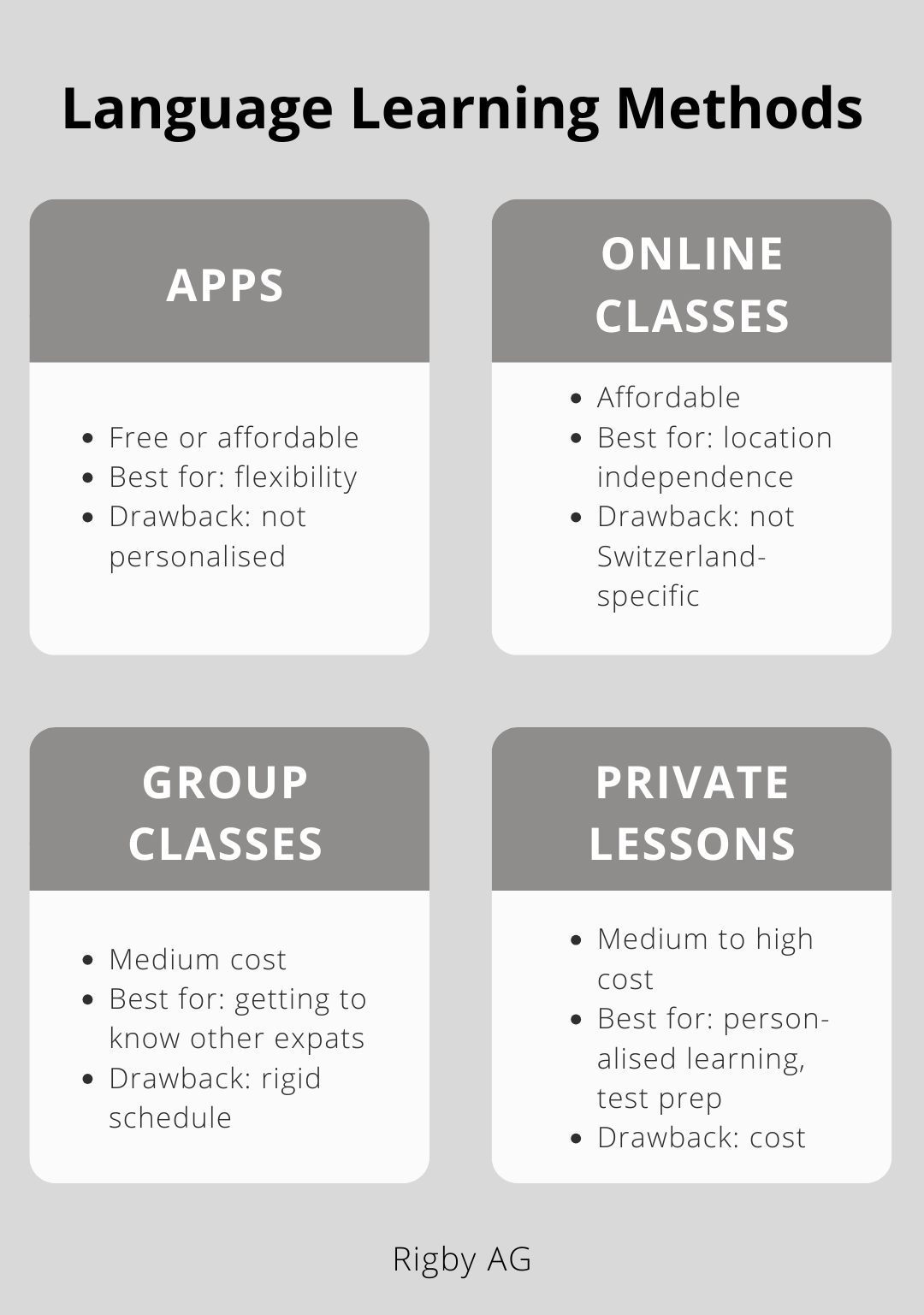How to Learn German in Switzerland
With four official languages and countless dialects, Switzerland’s language landscape is extremely diverse. For new expats, it can be tricky to understand which language they should learn. So, do you need to learn German in Switzerland and if so, what’s the best way to start?

Do the Swiss Speak German?
The official Swiss languages are German, French, Italian, and Romansh. Although the majority of the population in Switzerland speaks German, they mostly use a collection of dialects called Swiss German when talking together.
However, written communication is conducted in standard German in Northwestern, Central, and Eastern Switzerland. Road signs, advertisements, official letters, and public announcements are all in standard German.
Do I Need to Learn German?
Standard German is taught in schools, and most native Swiss German speakers are fully confident with the written language. Nevertheless, they often struggle with spoken standard German. Some Swiss natives even prefer to communicate with foreigners in English. But although some people argue that German isn’t as essential in Switzerland as in Germany, there are still several good reasons to learn it:
- Written communication is almost always in standard German.
- Some people, especially those over 60 or those living in rural areas, don’t speak good English.
- German is the primary language taught in many Swiss public schools. If you have children, learning German could help you communicate with their school.
- Many jobs require German language skills.
- You need to learn one of the local languages to become a citizen.
Further reading: Can You Get a Job in Switzerland If You Only Speak English?
Do I Need to Learn Swiss German?
If you’re only staying in Switzerland for a few months, you may not need to learn the local dialect. However, this can be beneficial if you’re looking to stay long-term. Some good reasons to learn Swiss German are:
- Natives appreciate you making the effort. Even knowing basic Swiss German can make a positive difference in your interactions with locals.
- You can use the language in everyday life. Casual communication becomes easier.
- Getting to know Swiss people can be challenging, but you’re much more likely to make Swiss friends if you speak their language.
Learn more: Podcast episode about Schwiizerdütsch: Exploring Swiss German
How to Learn German in Switzerland
You won’t have any trouble understanding the standard German used in Switzerland if you learn from a German or Austrian teacher. However, there are some particularities, and a Swiss teacher can help you understand cultural as well as linguistic nuances. The best way to learn German in Switzerland depends on your budget and aims.

Language-Learning Apps
The most popular language-learning app is Duolingo, but there are several others such as Babbel, Memrise, and Busuu. Many of these apps have a free tier, so you can start to learn German without spending any money.
While language-learning apps aren’t perfect, they’re a great way to begin, and they can also be a useful supplement to live classes. Some of the advantages are:
- You don’t have to dedicate a lot of time to language learning. Many apps allow you to practice for just 5-10 minutes a day.
- You can learn at any time and from anywhere.
- Most apps are gamified, so learning the language is fun.
- You can choose an app based on your needs. Some focus more on conversation, while others help you understand vocab or grammar.
However, you probably won’t learn German to a high level with apps alone. They don’t offer you the opportunity to spontaneously interact with other people, and it can be hard to stay motivated for many months.
Online Group Classes
Organisations like Lingoda, Babbel, and the Goethe Institut offer affordable group classes. You can find options for as little as $10-15 per lesson.
Online group classes are a good option if you’re busy or you aren’t ready to invest a lot of money in language learning. The main advantages are:
- Because the classes are location-independent, you can start learning before you arrive in Switzerland.
- There are often multiple timeslots, so the classes are reasonably flexible.
- You don’t have to stop taking classes if you move or when you’re travelling.
- Many classes are based on the CEFR syllabus, so they prepare you for language exams.
In-Person Group Classes
If you’re looking for a more local experience, in-person group classes could be perfect. Some of the biggest Swiss providers are the Migros Club School and Alemania. They offer group classes in many big towns. There are usually after-work or weekend options for people with 9-5 jobs. The advantages of in-person lessons are:
- You’ll most likely learn from a Swiss teacher or a long-term resident. They can teach you the cultural nuances of your area.
- You can meet other local language learners. Group classes are a great way to start building a social network in your new city.
- Live interaction with peers and your teacher can help you learn German in Switzerland more effectively.
- You can take a class that will prepare you for a CEFR exam.
 Group language classes in cities like Zurich can help you meet other expats.
Group language classes in cities like Zurich can help you meet other expats.
Private Tutoring
Private tutors are available both online and in person. Although one-to-one classes usually cost more than group lessons, they can offer you the most personalized experience. Reasons to choose a private tutor include:
- They will tailor your lessons to your specific strengths and weaknesses.
- They can be more flexible than a group class. You can choose a time, day, and frequency that suits you.
- Private classes are best for people with special educational needs, those who would like to learn particularly quickly, and those who have an unusual learning style.
- You can choose a tutor who meets your needs. This could be someone who comes to your house or workplace, someone who can also teach you Swiss German, or someone who speaks your first language.
Taking Language Tests
Many people who learn German in Switzerland want to eventually take a language test. The CEFR framework offers six levels:
- A1: Beginner
- A2: Pre-intermediate
- B1: Intermediate
- B2: Upper-intermediate
- C1: Advanced
- C2: Proficiency
Although requirements vary by region, you’ll most likely need to speak German at B1 level to become a citizen. Many universities and jobs, especially customer-facing ones, require a B2 or C1 level.
You can take these tests in most Swiss towns. If you’re interested, ask your language school or teacher before you start the course, so they know what your goal is.
 CEFR language exams are available all over the country, in larger cities as well as smaller towns like Fribourg.
CEFR language exams are available all over the country, in larger cities as well as smaller towns like Fribourg.
Tips for Learning German in Switzerland
Since you’ll mostly hear Swiss German on the street, practicing your German can be harder in Switzerland than in Germany. Fortunately, there are still lots of ways to improve quickly:
- Attend language meetups: You’ll find international groups offering German conversation sessions in every large city. They’re usually free, and you get to meet other expats.
- Focus on written German: You can get several free newspapers in Switzerland. One of the most popular is “20 Minuten”, which can be found at many train stops across German-speaking Switzerland. Take advantage of these publications to practice your German on the go.
- Learn to understand Swiss German: Speaking Swiss German isn’t so important, but if you can understand it, communication with locals gets much easier. You can speak to them in standard German, and they can reply in Swiss German.
- Get a tandem partner: Find a German speaker who’d like to learn a language you know well. Then, meet up regularly and take turns practicing the two languages.
- Tell people about your German goals: People may be eager to switch to English because they’re trying to be helpful. If you explain to them that you’re actively learning German, they may be more willing to speak German with you.
There are many different ways to learn German in Switzerland. The most important thing is to start as soon as possible. Sign up for our Rigby AG newsletter to claim your free Living in Switzerland ebook and get monthly news about topics relevant to expats.